The Smell Test that isn't taught when teaching "How a bill becomes law"
According to "Restoration Plan Gets First-Round Approval," subtitled "Merchants Fear They'll Be Evicted," from the Washington Post, last night, in the next to last DC City Council session, the 12 members in session voted in favor of an urban renewal deal to change considerably one of the last wholesale food distribution center in Washington, DC.
The Florida Market has more than 100 businesses, almost 70 different property owners, and a large retail component as well. Not to mention that revitalizing public markets, rather than "urban renewal-ing" them is one of the hottest trends in urban revitalization. Over the past few years, new markets have opened in places like San Francisco, Milwaukee, Minneapolis, Baltimore, New York City, and Vancouver, Washington. And many other cities, such as Honolulu, are exploring similar plans.
Fortunately, there is still one Council session left in the year, and one more chance for City Councilmembers to do the right thing.
No one says that the Florida Market is perfect. But the people who love the Market are a lot better go to people than the people who see the Market's value solely in the land and the location and not the use.
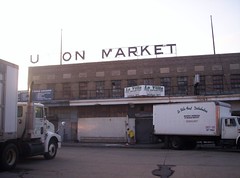
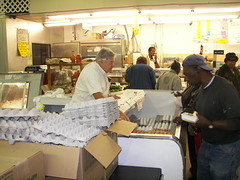
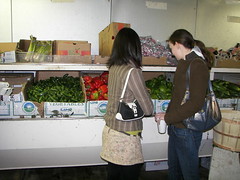

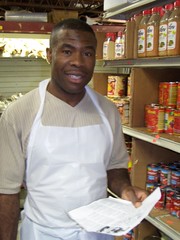
Here are some of the things to look for when determining whether or not legislation really smells:
1. No open process for tendering proposals, but a deal that selects specific and connected actors. (Don't ask questions about why one property owner owning 10% of the site has more clout than the other 60+ property owners. And don't ask why other groups of property owners didn't have the ability to tender counter proposals.)
2. Say it promotes affordable housing. (The provisions aren't much different than other projects underway in the city.)
3. When you can't get it out of committee, attach it to another bill, one that's difficult for other councilmembers to vote against. (Also see "rider.")
4. Bus in senior citizens to sit in the hearing room to show community support. (Don't check to see if they were given money and/or food to come. Or where they live or if they shop at the market.)
5. Don't pay much attention to how ex-Councilmember/lobbyists have their hands all over the bill.
6. Get it on the Council Agenda the day before the second to last Council session before new Councilmembers take office.
-----------------------
Granted, this is about federal laws, which are just as bad... but check out "How Laws are Made" from the U.S. House of Representatives.
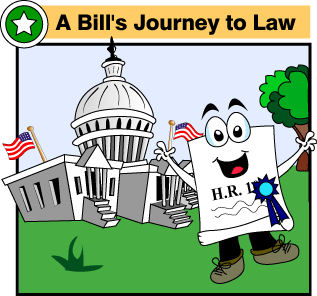 Image from the House of Representatives website.
Image from the House of Representatives website.This is more accurate. (Click on the image for a larger version.)
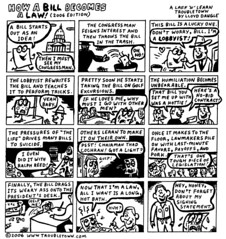 Troubletown cartoon by Lloyd Dangle.
Troubletown cartoon by Lloyd Dangle.Index Keywords: dirty-deeds-done-dirt-cheap; food-agriculture-markets



0 Comments:
Post a Comment
<< Home